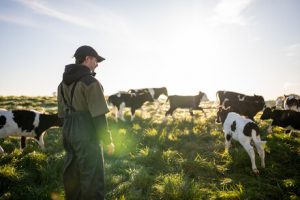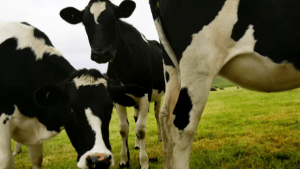
Overall export volumes were down, however, due to supply constraints and higher prices. Writing in the most recent U.S. Dairy Exporter Blog, USDEC staff summarized February 2022 dairy export data and discussed key reasons for the divergence between volume and value:
Value basis: February 2022’s total U.S. dairy export value surged 23% from a year ago to $696.8 million, a new record high for the month.
Volume basis: Strong U.S. shipments of cheese, butterfat and lactose came close to offsetting declines in milk powder and whey but fell just shy. U.S. shipments of butterfat jumped 75% to 6,755 metric tons (MT), the biggest month for U.S. butterfat exports since April 2014. U.S. lactose exports grew 15% to 28,776 MT, and cheese gained 9% to 32,953 MT, setting a record for the month and extending the year-over-year growth streak to eight consecutive months.
That was offset by volume declines of nonfat dry milk/skim milk powder (NFDM/SMP) to most major buyers, led by declines to the top two U.S. milk powder markets, Mexico and Southeast Asia. Reduced Chinese demand continues to dampen U.S. whey exports, but overall volume in February finished better than expected, slipping only 4.5%.
Milk solids basis: At 175,602 MT, the export volume of dairy solids declined by 1%.
What’s ahead?
Global cheese demand remains strong, and tight supply and favorable pricing continue to benefit U.S. suppliers. Much of the U.S. cheese growth in February came from a 59% increase in cheddar volume, which is being primarily driven by competitive pricing, available supply and good demand.
There were some encouraging signs in whey in February, including a 14% increase in modified whey shipments and a much stronger buying presence by Japan.
The recovery in U.S. dairy exports to Mexico has somewhat stalled as of late. In February, overall U.S. dairy exports to Mexico contracted 10% in terms of milk solids equivalent but jumped 28% in value. While the government remains optimistic about milk production in 2022, Mexico’s leading dairy trade association has pushed back against the official statistics and expects production to be down by 3.3% this year. This tighter domestic environment for milk is supportive of U.S. imports into the country, and it is likely to continue in 2022. However, a strong dollar could still temper demand.
CWT-assisted exports
The National Milk Producers Federation (NMPF) updated Cooperatives Working Together (CWT) program-assisted export contracts. March 2022 sales contracts covered 6.7 million pounds of American-type cheeses, 37,000 pounds of butter, 611,000 million pounds of whole milk powder and 895,000 pounds of cream cheese.
Through the first three months of the year, contracts total 36.5 million pounds of American-type cheese, 37,000 pounds of butter, 14.7 million pounds of whole milk powder and 4 million pounds of cream cheese, for a total milk equivalent for the year of 477 million pounds (milkfat basis). CWT estimates are based on contracts for delivery not completed export volumes.
Here’s a look at other export trends followed by Progressive Dairy:
Hay exports rebound somewhat
After slumping to a 12-month low in January, February exports of alfalfa hay hit a four-month high at 232,170 MT. Most of the rebound was attributed to the two major markets, China and Japan, each up about 14,000 MT from the month before. Exports to China in February 2022 totaled 123,614 MT, a three-month high and represented about 54% of the month’s total. At 62,768 MT, Japan was the second-leading market and represented 26% of the month’s U.S. total. Alfalfa hay exports were valued at about $399 per ton, up $19 from January.
At 116,897 MT, February exports of other hay also rebounded slightly. Sales to Japan were estimated at 72,139 MT, representing 62% of the U.S. total for the month. Sales to South Korea at 24,881 MT hit a four-month high and represented 21% of total sales in February 2022. Other hay exports were valued at about $394 per ton, up $18 from January.
The outlook for U.S. hay exports is improving, although logistical struggles remain, according to Christy Mastin, sales representative with Eckenberg Farms, Mattawa, Washington.

























